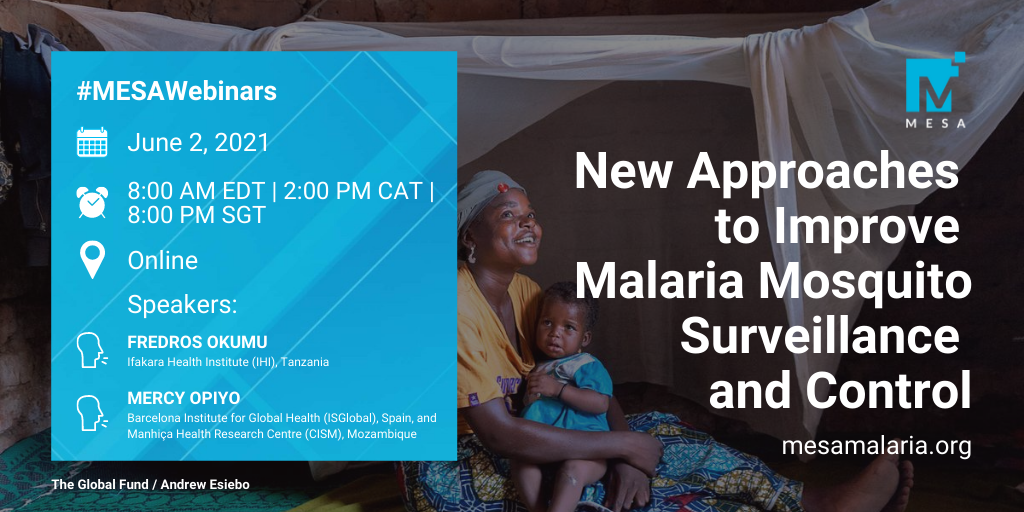MESA Webinar 2 – New approaches to improve malaria mosquito surveillance and control
Published: 22/06/2021
This report is brought to you by the MESA Correspondents Nkemngo Francis Nongley, Vita Mithi, Faith Hungwe, and Ana Alonso.
THEMES: THEMES: Vector Control
MESA Correspondents bring you the coverage from the MESA Webinar 2 – New approaches to improve malaria mosquito surveillance and control
Thursday, June 10th, 2021
Opening Remarks
Regina Rabinovich (Barcelona Institute for Global Health – ISGlobal, Spain), warmly welcomed the participants to the second MESA webinar, the platform to showcase the work of malaria-endemic researchers. Rabinovich explained that the main goal of the webinar series is to amplify the voices of malaria-endemic researchers and the work that’s being done, while also bringing together the malaria community.
She introduced the moderator, Carlos Chaccour (Barcelona Institute for Global Health – ISGlobal, Spain), and named both presenters, Fredros Okumu and Mercy Opiyo.
Carlos Chaccour then proceeded to lead the session by introducing both presenters.
Some Reflections on the Next Phase of Malaria Control in Africa
Fredros Okumu (Ifakara Health Institute, Tanzania) started his presentation by introducing the main discussion question of what the next phase of malaria control in Africa should look like.
While we normally focus on what has happened since the year 2000 when discussing malaria research, Okumu proposes to look at longer periods. Professor Bob Snow and colleagues, from the 1990s to 2015, looked at malaria trends and interventions implemented by different countries before they had access to newer tools. Okumu pointed out that similar reductions in malaria control to the one in the year 2000 have occurred, but this one was much more accelerated.
What can we do to achieve real gains in malaria control in Africa now? There are differences in malaria epidemiology in Africa that may underlie some of the differences in control reforms. A recent analysis based on human blood suggests that the vectors in Africa are significantly more endophilic. If we add insecticide resistance, heterogeneity, human behavior, rural population, and social-economic status, we consequently get the perfect ecosystem for malaria to thrive. All these issues are to be addressed if we want effective control interventions to work.
Malaria control strategies today are mostly about commodities such as medicines or early diagnosis, which are very effective but cannot be used in isolation. One of the biggest issues is low-quality data and the inability of local experts to analyze data which creates a disconnect between the generated data and the strategies put in place by these countries. There is a great need for health systems that are receptive and that can ensure the efficacy of an intervention.
Okumu proposes that moving forward, countries with the greatest parity should take advantage of local leadership and invest in the next phase of malaria control to ultimately build capacity locally and depend on quality data that lead the decision-making efforts.
We Spray and Walk Away, but Who Are We Protecting with Indoor Residual Spraying (IRS)? Revisiting the Coverage Indicator and Human Behavior
Mercy Opiyo’s (Manhiça Health Research Centre – CISM, Mozambique and the Barcelona Institute for Global Health – ISGlobal, Spain) work consists of revisiting the coverage of IRS in relation to human behavior. IRS consists of spraying inside houses with long-lasting insecticides that ultimately reduce the mosquito population and consequently malaria transmission. The IRS process faces challenges that lead to a deployment period of up to four months. Firstly, after a spraying campaign, does the community perform activities in the households risking doing something that might affect the residual efficacy of the product sprayed? Secondly, during the deployment of IRS, there is a possibility that some houses or rooms are missed. Opiyo raises the question of how these two factors affect IRS’s coverage and overall impact on the community.
The first step taken by Opiyo’s team was to look at the neglected impact of housing modification after IRS in two districts in southern Mozambique: Matutuine, sprayed with Actellic, and Boane, sprayed with SumiShield. Step two was to model the impact of housing modification on IRS coverage, residual efficacy of IRS product, impact of prolonged IRS campaign, and mosquito biting rates.
In Matutuine, the results showed that after spraying Actellic, wall modification was happening every month, whereas in Boane, household modification occurred less frequently. Furthermore, in Matutuine, household owners added rooms after the IRS at a much higher rate than in Boane district. Most of these added rooms were sleeping and living spaces. Overall, there was more housing modification taking place in Matutuine than Boane and these modifications were happening through painting, washing, brushing, and clustering household walls after IRS. Housing modification reduced IRS coverage for both communities, but it was significantly higher in Matutuine. Household modification increased mosquito bite risk in both districts, but Matutuine was found to be at a higher risk.
Opiyo stressed the importance of assessing housing modifications after the IRS campaigns and including it in programmatic monitoring and evaluation (M&E) to understand where and how the neglected protective gap can be closed to improve protection and impact.
Closing remarks
After the Questions & Answers session, Regina Rabinovich and Carlos Chaccour thank both speakers for their wonderful presentations and hope the audience had enjoyed the presentations as well while encouraging them to continue attending the MESA webinar series in the coming weeks.
**Read here the pending questions & answers addressed by the speakers after the Webinar.
This report is brought to you by the MESA Correspondent Ana Alonso Munana (Georgetown University, USA). Senior editorial support has been facilitated by the MESA Team.
Published: 22/06/2021
This report is brought to you by the MESA Correspondents Nkemngo Francis Nongley, Vita Mithi, Faith Hungwe, and Ana Alonso.
THEMES: Vector Control



